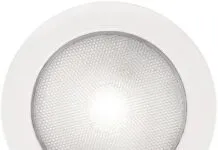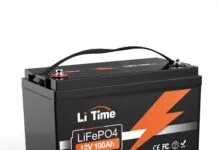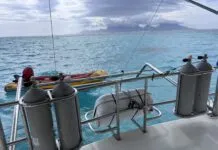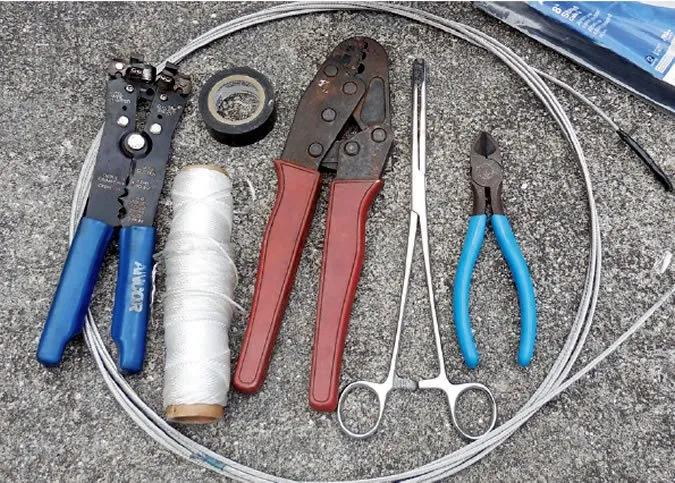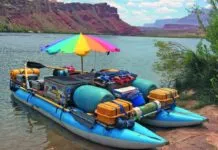Caulks Versus Mildew
We expect a lot from sealants. They must withstand UV, salt and cleaning chemicals, bond to everything, flex to absorb mechanical and thermal strains, be strong but removable when equipment needs serviced, and stay white. Wow. In PS Marine Sealant Adhesion Tests (December 2016) we tested the shear strength of many caulks on many materials and delivered a few tentative recommendations. Three years later, it is time to follow-up with field observations.
Chlorine and Caulk Don’t Mix
While interviewing boat maintenance professionals for background information preferences, several quipped that in reality, they replace far more caulk because its mildewed than because it has failed or stiffened. They seemed to favor either 3M 4000 UV or Sika 291 for exposed uses, because they leave a smooth finish and resist mildew. When we asked about strength and bonding on-deck, they referred us back to the mildew problem. Thats what causes most of their call-backs. (Below the waterline, where looks don't matter, they favored 3M 5200 or Sika 291.)
Picking the Best Bottom Paint
This months report on bottom preparation is another reminder that the most effective paint as determined by our past testing might not always be the best for your circumstances or location.
Sailors Reading List for 2019
Few pleasures can compare to the warm comfort of curling up with a good book while another winter front blows through. Whether youre holing up in the Bahamas waiting for the wind to clock, or tucked beside the woodburning cabin stove in Puget Sound, here are some recent publications to help you dream and scheme your way to your next adventure.
Mailport: Dustless Sanding
Regarding your recent Waypoints article about making your own dustless sander (see Dustless Sander, PS April 2016 online) I added a Dust Deputy (~$50 Ace Hardware) upstream of my shop vac around 3 or 4 years ago.
The Sailor’s Boot Dryer
I like the outdoors. I sail year-round, and I can endure as much heat and cold as my passions demand. But whether it is summer or winter, I just can't abide cold, wet feet. There is something about damp socks that chills me through. If my feet are warm, Im warm.
Heat-Seal Connectors
A typical cruising boat has thousands of electrical connections. The consequence of failure range from a light that doesn't work to a fire that can cost lives.
Mailport: Cold Weather Suits
Regarding your recent Inside Practical Sailor blog post Drysuits vs. Survival Suits, I raft the Colorado river in Grand Canyon where water temps are around 50 F, even in the summer. The whitewater down there is furious and sometimes dangerous. I wear a 3 millimeter neoprene wetsuit under a full drysuit. If the drysuit rips, the wetsuit should slow down thermal loss. The problem is heat buildup in the sun. The solution is to jump in the cold water now and then to keep from over heating. On a sailboat that would be harder to do. There have been a few times sailing solo when I wore both garments, but it was pretty clammy inside. There is no perfect solution, just reasonable compromises by which to stay alive. Something to remember is that once a drysuit rips, it will take on hundreds of pounds of water. A high flotation PFD is mandatory, at least 26 pounds I would think.
Repairing Plastic Tanks
Plastic holding tanks and water tanks have the advantage of not corroding, but they are hardly failure proof. Plastic holding tanks can crack and fail under extreme vacuum pressure if the vent is clogged. An errant drill or saw used to make adjacent repairs can puncture a tank. Or a poorly secured tank can be hurled across a cabin and crack.
What About Polyethylene Fuel Tank Repairs?
Fixed tanks are generally safe from the sun, buried in the bowels of the ship. But jerry cans are often kept on deck, scorched by UV from the sun. They take a beating, hauled back and forth in the dinghy. Seams split and bottoms wear. Sunbrella covers can last for a decade at least, keeping the cans strong.






















